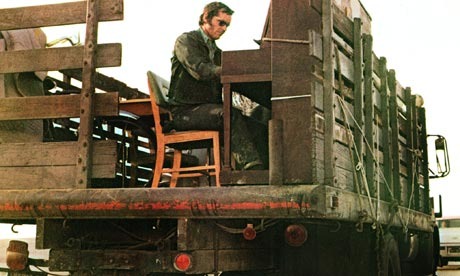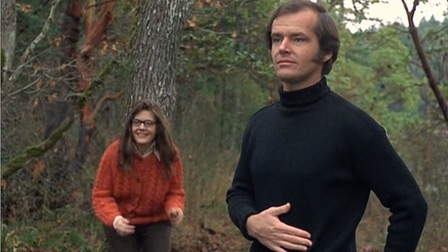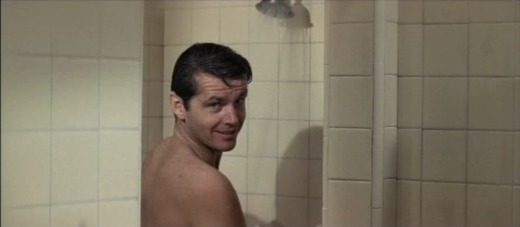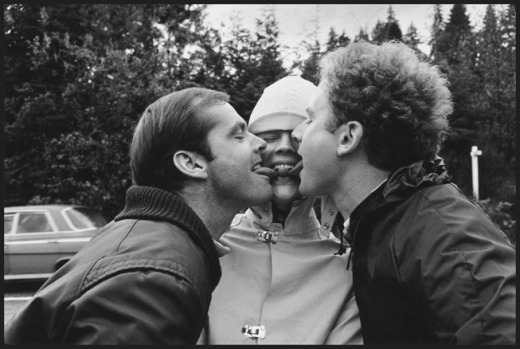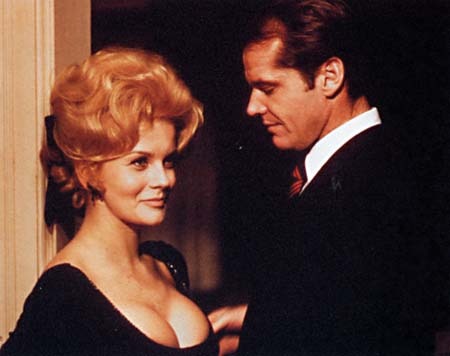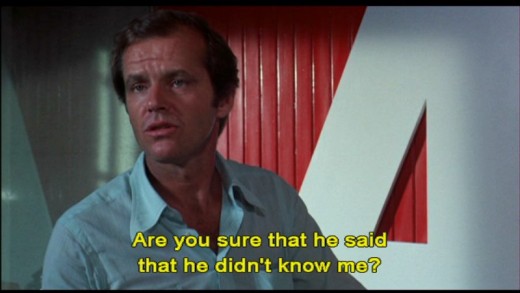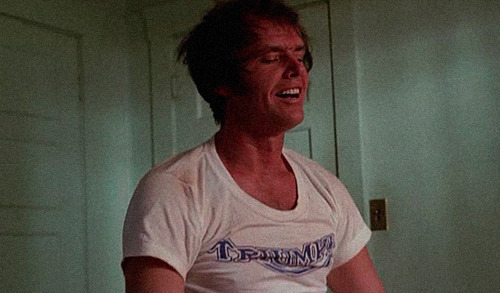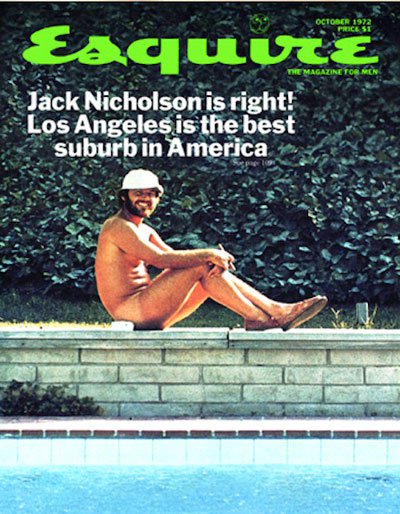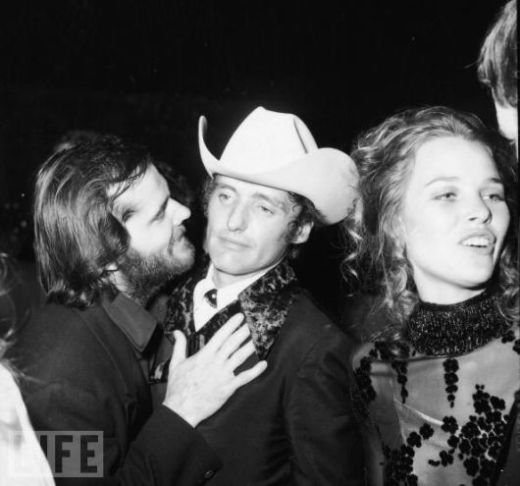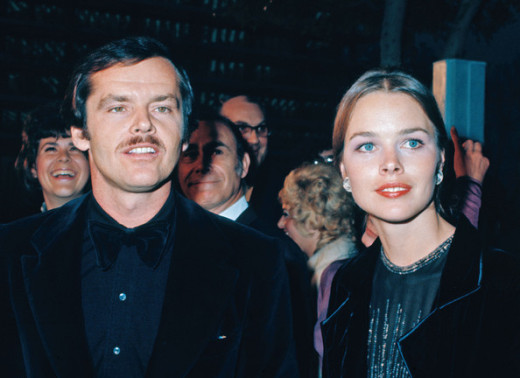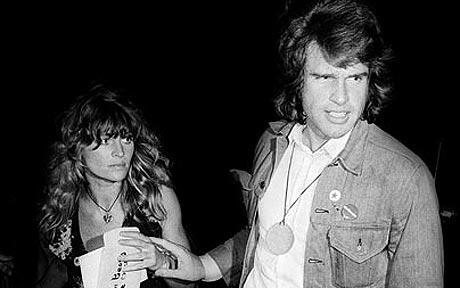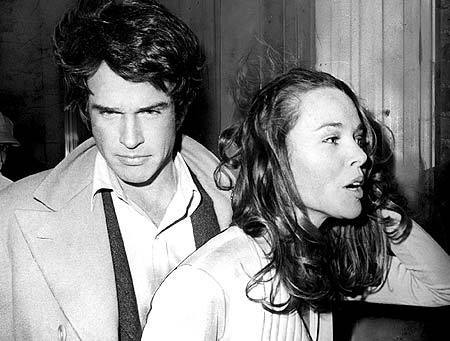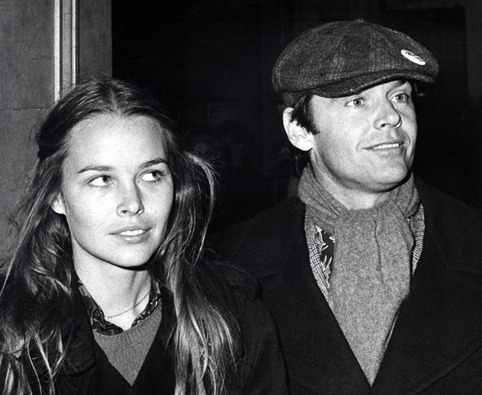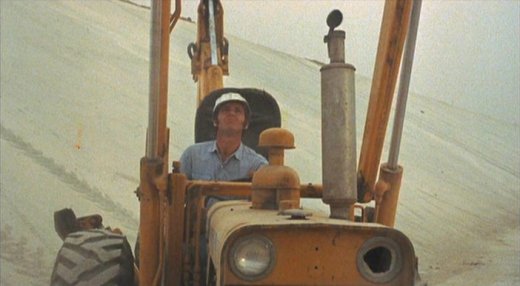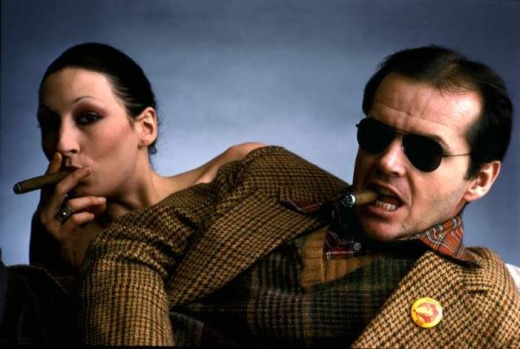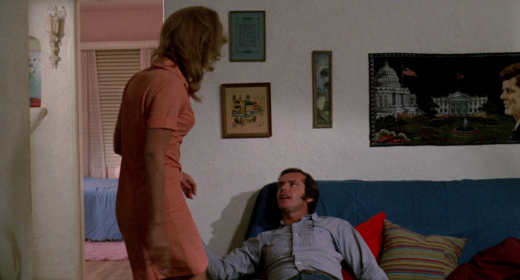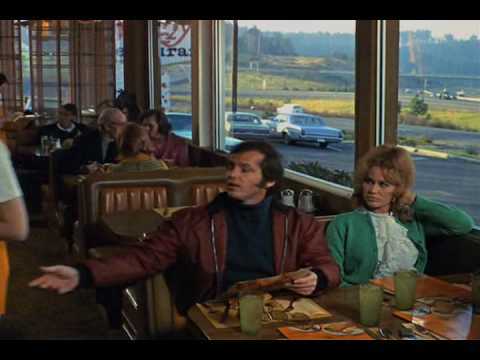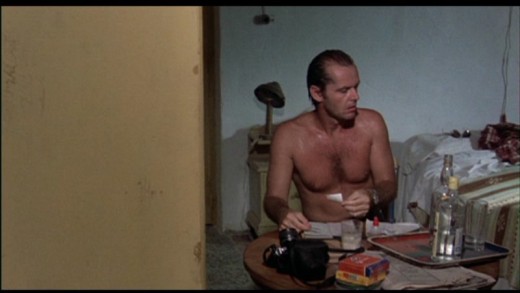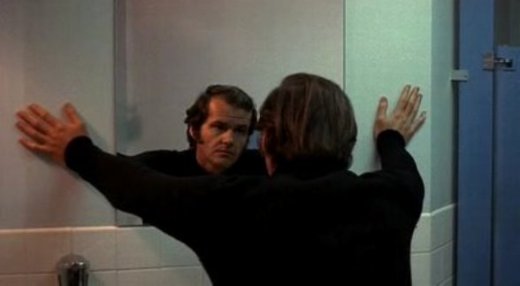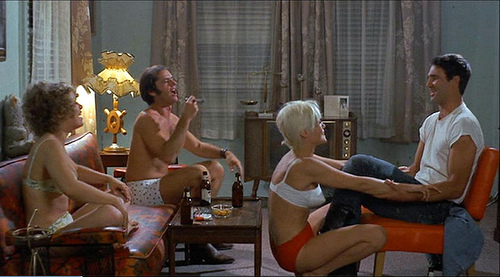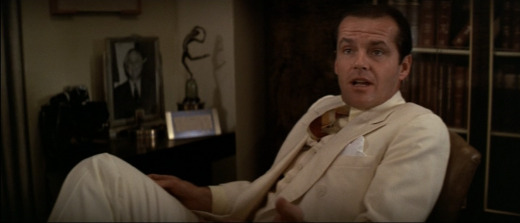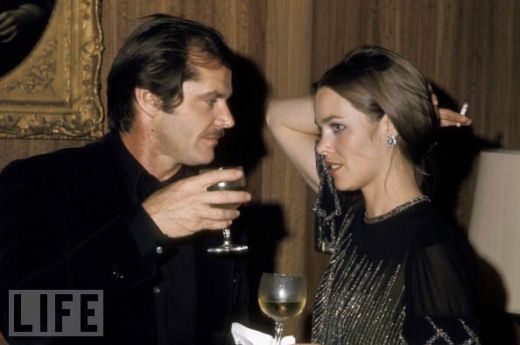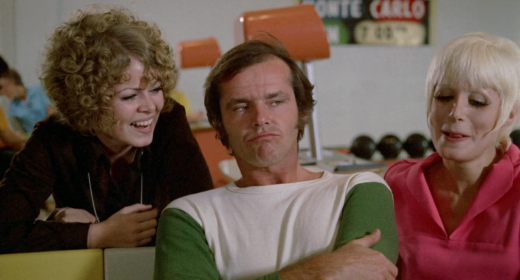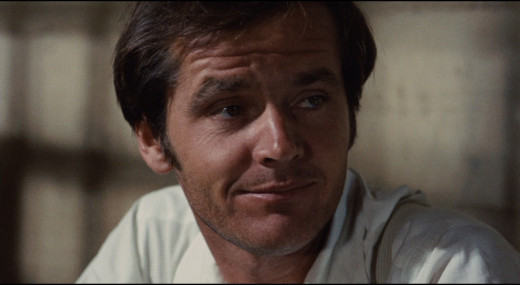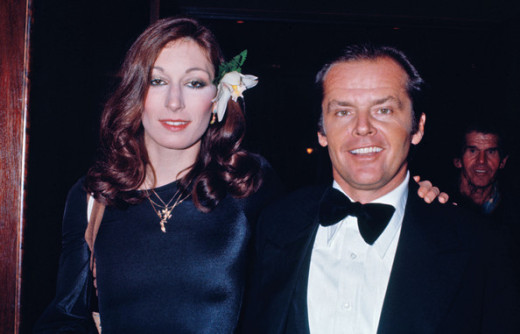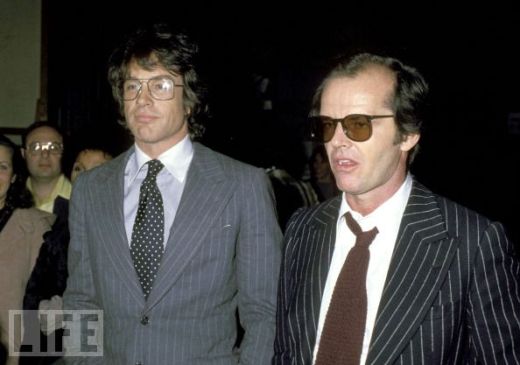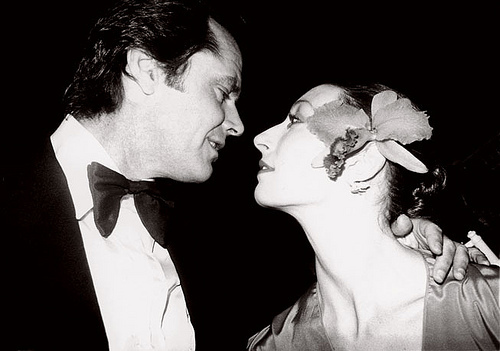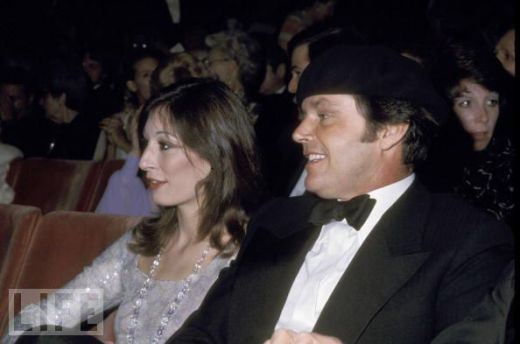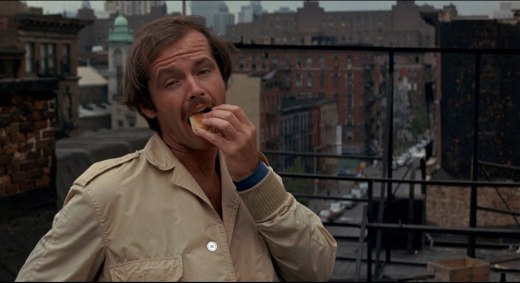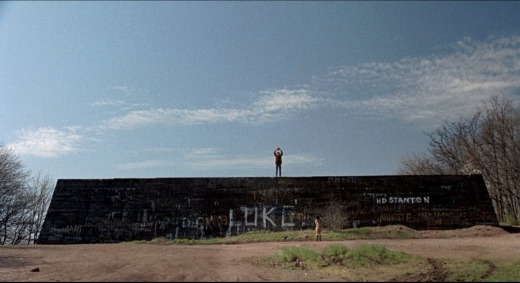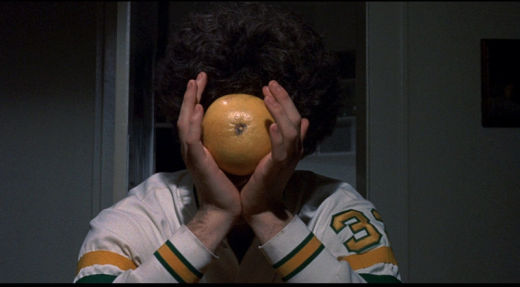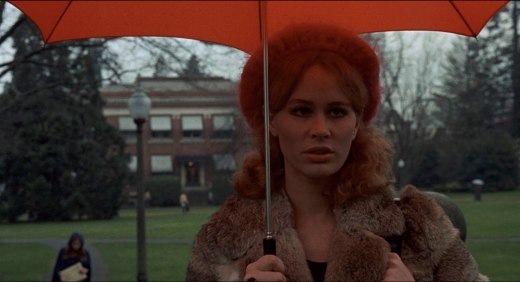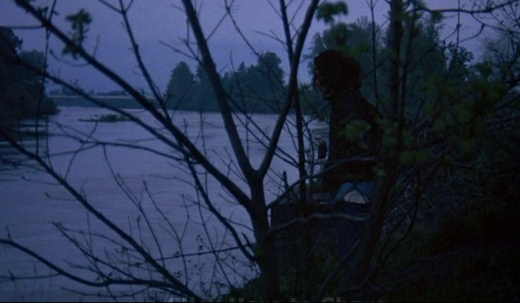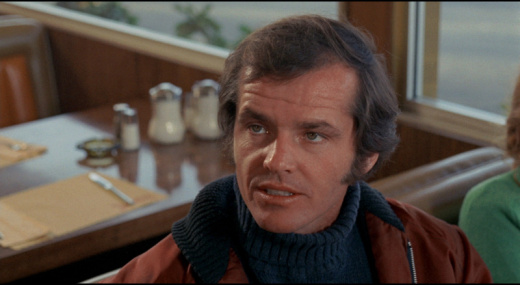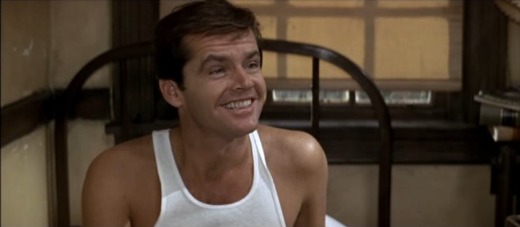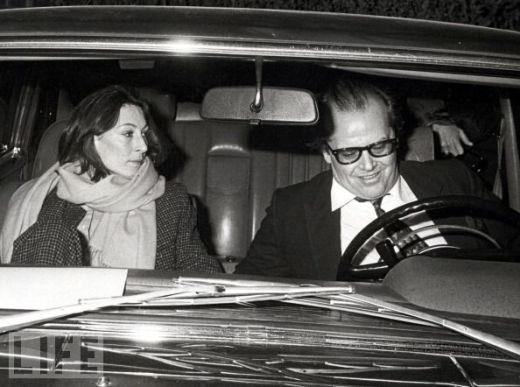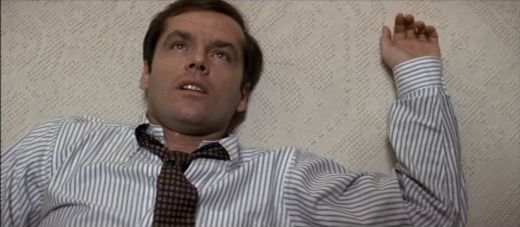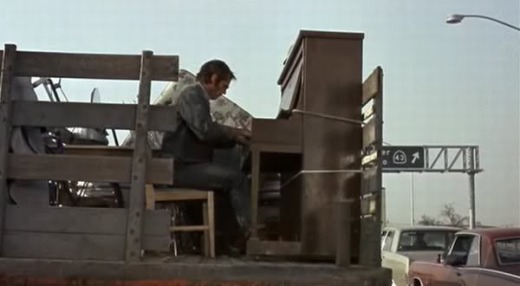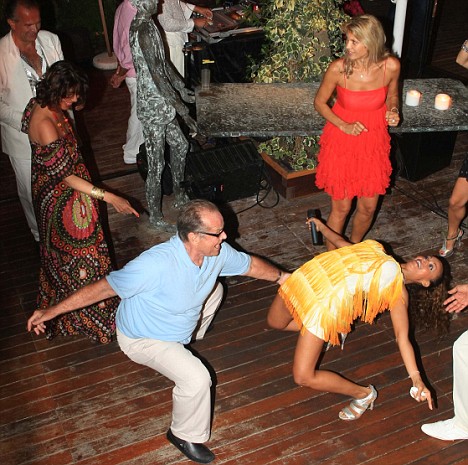 FILM
FILM In Which Warren Beatty Is A Dirtbag For The Ages
 Monday, March 28, 2011 at 11:19AM
Monday, March 28, 2011 at 11:19AM 
Warren Beatty In Love
by ALEX CARNEVALE
If I have a fault in relation to women, it's that I'm too dependent on love. When I'm deeply involved and all is not going well, my creative impulses become somewhat sublimated. I used to think the answer was not to get involved.
Warren Beatty was wild about Joan Collins. He was enthusiastic about his relationship with her beyond anything he had sampled before. As Warren's friend Verne O'Hara put it, "Sex drives Joan. She was besotted with him. And he was besotted with her." He defended her acting ability constantly, with his fists if necessary. He also used her for his own ends; suggesting she leave the set of a British adaptation of Sons and Lovers as the cast left for England because the publicity she attracted was more useful to him by his side. She was something in Hollywood, and that was what he wanted to be.
For her part, she was devoted to him, and he even bought an engagement ring for her, a gold beacon surrounded by emeralds and diamonds. In January of 1959, they moved into a tiny studio apartment in the Chateau Marmont.
 on the set of 'A Loss of Roses'At 22, Beatty was a veritable ball of energy, utilizing his photographic memory for phone numbers to make hundreds of calls a day in between fucks. He resisted proposing to Collins because he simply could not get cast. It was Elia Kazan putting him in the William Inge, Kansas-set morality play Splendor in the Grass that began his career better than lhis sideshow act with Collins ever could. (The magnetic Natalie Wood was his co-star.) Right before his first day on the set of Splendor, Collins became pregnant, and aborted the child quietly so as not to alert the press. The next day production began. When Beatty faltered opposite his celebrated costar, Kazan said, "Pretend it's Joan, Warren."
on the set of 'A Loss of Roses'At 22, Beatty was a veritable ball of energy, utilizing his photographic memory for phone numbers to make hundreds of calls a day in between fucks. He resisted proposing to Collins because he simply could not get cast. It was Elia Kazan putting him in the William Inge, Kansas-set morality play Splendor in the Grass that began his career better than lhis sideshow act with Collins ever could. (The magnetic Natalie Wood was his co-star.) Right before his first day on the set of Splendor, Collins became pregnant, and aborted the child quietly so as not to alert the press. The next day production began. When Beatty faltered opposite his celebrated costar, Kazan said, "Pretend it's Joan, Warren."
 wardrobe test for 'splendor in the grass' from elia kazan's private albumBeatty was so incredibly into himself that he began weight-training during the production to make sure he looked his best onscreen. When teenage girls around the production noticed megastars Collins and Wood but not him, Warren righted the wrong by arranging for another group to giggle loudly during his scenes. Eventually Joan Collins had to go to Rome to shoot Raoul Walsh's Esther and the King, and while she was there Beatty became convinced she was unfaithful to him.
wardrobe test for 'splendor in the grass' from elia kazan's private albumBeatty was so incredibly into himself that he began weight-training during the production to make sure he looked his best onscreen. When teenage girls around the production noticed megastars Collins and Wood but not him, Warren righted the wrong by arranging for another group to giggle loudly during his scenes. Eventually Joan Collins had to go to Rome to shoot Raoul Walsh's Esther and the King, and while she was there Beatty became convinced she was unfaithful to him.
 on the set of 'The Roman Spring of Mrs. Stone' with Vivien Leigh and girlfriend Joan CollinsAs his time on The Roman Spring of Mrs. Stone was ending, he wrote to agent Eleanor Kilgallen from London:
on the set of 'The Roman Spring of Mrs. Stone' with Vivien Leigh and girlfriend Joan CollinsAs his time on The Roman Spring of Mrs. Stone was ending, he wrote to agent Eleanor Kilgallen from London:
Dear Eleanor,
Don't ask me why all of a sudden I'm able to write letters. I don't know. Anyway – I'm through with the picture now. I have just a little dubbing and stuff to do and that will be it. Next I want to go to Paris and then on to Rome and anywhere else that is interesting and everything is interesting.
 with Joan CollinsAs you know – this is the first time I haven't had to worry about where my next dollar is coming from and it is making a lot of things more enjoyable for me. I have been offered several scripts – but I don't know what I am going to do...some people over here have offered me a thing called Bird of Passage (which I am)...
with Joan CollinsAs you know – this is the first time I haven't had to worry about where my next dollar is coming from and it is making a lot of things more enjoyable for me. I have been offered several scripts – but I don't know what I am going to do...some people over here have offered me a thing called Bird of Passage (which I am)...
I think I will be a few more weeks over here in the old world before New York – But who knows, they may call me back to accept an academy award for last year...
Love,
Warren
 with joan collinsAlthough he and Collins were still engaged, they had already called off a planned wedding and were continents apart. He went after Julie Newmar in Rome without success and sought consolation with the daughter of Actors Studio founder Lee Strasberg, Susan, in Rome. He had sex with her continuously, notably in Luchino Visconti's bathroom. (Visconti was older, gay and loved Beatty.)
with joan collinsAlthough he and Collins were still engaged, they had already called off a planned wedding and were continents apart. He went after Julie Newmar in Rome without success and sought consolation with the daughter of Actors Studio founder Lee Strasberg, Susan, in Rome. He had sex with her continuously, notably in Luchino Visconti's bathroom. (Visconti was older, gay and loved Beatty.)
 in an episode of the hitchcock tv series 'Suspicion'When Beatty returned to Los Angeles, his relationship with Collins consisted largely of fighting and fucking. She eventually ended it when she saw he would not. On the promotional tour for Splendor in the Grass, the previously unfriendly Natalie Wood, freshly divorced and starving herself down to 88 pounds, began to know get to know Warren better. It's amazing she didn't run screaming in the other direction.
in an episode of the hitchcock tv series 'Suspicion'When Beatty returned to Los Angeles, his relationship with Collins consisted largely of fighting and fucking. She eventually ended it when she saw he would not. On the promotional tour for Splendor in the Grass, the previously unfriendly Natalie Wood, freshly divorced and starving herself down to 88 pounds, began to know get to know Warren better. It's amazing she didn't run screaming in the other direction.
The press jumped all over Warren as a homewrecker because Natalie would not publicly reveal that her ex-husband Robert Wagner was the cause of the divorce. In any case, the relationship sold the movie well, and continued to bring attention Beatty's way.
 on the set of 'The Only Game In Town'
on the set of 'The Only Game In Town'
After the release of Splendor in the Grass, Beatty took up residence at the Delmonico Hotel on 59th Street and Park Avenue in New York. His relationship with Wood stood in stark contrast to the life he shared with Collins. Joan was a carefree, happy woman; Wood was depressive, serious and self-involved. As the romance began to fall apart, Beatty's behavior became increasingly extreme. On a blind date with one woman, he invited her to a restaurant he knew was closed, took her back to his house, closed the door and dropped his pants.
One of his one-night stands was an unknown 16 year old Cher, who later reflected that "I did it because my girlfriends were just so crazy about him, and so was my mother. I saw Warren, he picked me up, and I did it. And what a disappointment! Not that he wasn't technically good, or couldn't be good, but I didn't feel anything. So, for me, I felt there's no reason for you to do that again." Shortly thereafter, Warren began to see an analyst for the first time.
 with natalie woodBeatty's infidelity towards Wood around Hollywood became an open secret. His signature move was calling women up in the middle of the night, when he would regale them with "What's new, pussycat?" Incredibly, this worked, but it wasn't necessarily the approach. Warren could be very sweet to women; he excelled at paying them the kind of attention they desired and he looked like a god. When Warren asked Wood to come say goodbye to him at an airport, she finally summoned the courage to dump him.
with natalie woodBeatty's infidelity towards Wood around Hollywood became an open secret. His signature move was calling women up in the middle of the night, when he would regale them with "What's new, pussycat?" Incredibly, this worked, but it wasn't necessarily the approach. Warren could be very sweet to women; he excelled at paying them the kind of attention they desired and he looked like a god. When Warren asked Wood to come say goodbye to him at an airport, she finally summoned the courage to dump him.
After a terrible experience filming Robert Rossen's Lilith, Beatty decided he wanted more control on future projects. Keen to promote himself off the failure, Beatty planted ludicrous items in the gossip columns about himself. One read: "Three girls who met each other at one of Warren Beatty's swinging bachelor parties in New York last week discovered that, in various years, they had all been Miss Sweden." To lend credence to the hyperbole, he took up with Italian babe Claudia Cardinale.
His savvy eye as a producer led him to a rough script by Billy Wilder's writing partner I.A.L. Diamond. After a co-producer heard Warren whisper his trademark seduction to one young woman, he suggested What's New, Pussycat as a title. The script, however, was dated. After Beatty's first choice to punch it up, Elaine May, declined, he settled on a young Jewish comic he'd seen perform in New York: Woody Allen. The day John Kennedy was assassinated, Beatty spent a cold morning trying to get Stanley Kubrick to direct the picture.

His new love was precociously beautiful French actress Leslie Caron. At 32, she was six years older than him. When they met, Caron was married to the English stage director Peter Hall, and the European coupling had already produced two young children. This of course meant nothing to Warren: Caron's background in ballet reminded Beatty of the career in dance shared by his mother and sister Shirley MacLaine, and Caron's marriage was falling apart. Peter Hall recalled that she flew to him in London and "after a couple of days, Leslie told me she was in love with Warren Beatty and had decided to leave me and go back to Hollywood."
Caron and Beatty were very close – she even administered oxygen out of a tank to him on the set of the film Mickey One. That didn't stop Warren from running around behind her back, including a particularly memorable jaunt at the Playboy Mansion.
 with alexandra stewart on the set of Mickey OneThe road to Bonnie and Clyde began when Beatty met Esquire writer Robert Benton shortly after his breakup with Gloria Steinem in spring of 1963. Benton's despondency had led him to the films of François Truffaut (especially Jules and Jim), and the Texas-born writer and his friend David Newman began to write a script about Clyde Barrow and Bonnie Parker.
with alexandra stewart on the set of Mickey OneThe road to Bonnie and Clyde began when Beatty met Esquire writer Robert Benton shortly after his breakup with Gloria Steinem in spring of 1963. Benton's despondency had led him to the films of François Truffaut (especially Jules and Jim), and the Texas-born writer and his friend David Newman began to write a script about Clyde Barrow and Bonnie Parker.
After the two showed their treatment to Truffaut himself (they could barely believe it), Truffaut considered Jean-Luc Godard as director, since Godard could speak better English, a choice later abandoned when the Paris-born director demanded they shoot it in New Jersey. Beatty inserted himself into events by picking the treatment for Bonnie and Clyde up off the desk of producer Harrison Starr. When he was cut out of What's New, Pussycat, he pursued his passion for the project, vowing he would have total control.

He had a remarkably similar attitude about his relationship with Caron, which was rocked by a messy custody case brought on by her ex-husband Peter Hall. Beatty found her an analyst. She later reflected: "Once he was interested in a woman, he would never let go. He enveloped her with his every thought. He wanted total control of her, her clothes, her make-up, her work. He took notice of everything. He sent every one of us to a psychoanalyst. He believed the experience was beneficial. He was right."
When his performance in Lilith was roundly slammed by critics, he slept with one of them, and his infidelity became even crazier. He had sex with Bernadette Peters after seeing her once onstage. When he paid $75,000 out of his own pocket for the rights to Bonnie and Clyde in 1965, his real Hollywood career began.

Beatty's first idea was to cast his sister as Bonnie and Bob Dylan as Clyde, which would have been extremely weird. He also thought about directing, but when he fell in love with the part of Clyde Barrow, both his sister and directing were out.
As with his previous relationships with starlets, Leslie Caron had to break up with Beatty. She was deeply hurt that Warren had dumped her from Bonnie and Clyde, and flew to England to be with her children. (Before he took up with Julie Christie, who he had glimpsed during a screening of Born Free, Beatty became infatuated with the married 44-year old Russian ballerina Maya Plisetskaya.)
 curtis hanson's photoset of faye dunawayStill friendly with Natalie Wood, Beatty wanted her for the part of Bonnie, but director Arthur Penn didn't want a star. Jane Fonda said no. Tuesday Weld said no. Ann-Margret said no. Sharon Tate said no. Natalie Wood said no again. According to Beatty, "I was turned down by every living actress." After seeing her onstage, it was Penn who found Faye Dunaway, and photos taken by Curtis Hanson secured her the role.
curtis hanson's photoset of faye dunawayStill friendly with Natalie Wood, Beatty wanted her for the part of Bonnie, but director Arthur Penn didn't want a star. Jane Fonda said no. Tuesday Weld said no. Ann-Margret said no. Sharon Tate said no. Natalie Wood said no again. According to Beatty, "I was turned down by every living actress." After seeing her onstage, it was Penn who found Faye Dunaway, and photos taken by Curtis Hanson secured her the role.
Somehow, Warren kept his hands off her. Dunaway felt that if they were not platonic, it would ruin the film. A friend of Beatty's submitted in Suzanne Finstad's biography that "Warren didn't do it with Faye because Clyde was supposed to be impotent."
 standing ovation at the montreal film festival for 'bonnie and clyde'Julie Christie was still on his mind. He drove out to Sausalito in a long white limo, circling for hours until he found where she was staying. Christie was different from most women he tried to seduce; she was completely without pretense or affectation, and initially resistant to his advances. But they got together anyway. Because of the resounding success of Bonnie and Clyde, Beatty was on top of Hollywood for the first time in his life. He turned down Roman Polanski's Rosemary's Baby, feeling it was "not important enough." It was the first in the string of immortal projects he passed on, many because he would be preoccupied by campaigning for George McGovern, including The Godfather, The Sting, and Butch Cassidy.
standing ovation at the montreal film festival for 'bonnie and clyde'Julie Christie was still on his mind. He drove out to Sausalito in a long white limo, circling for hours until he found where she was staying. Christie was different from most women he tried to seduce; she was completely without pretense or affectation, and initially resistant to his advances. But they got together anyway. Because of the resounding success of Bonnie and Clyde, Beatty was on top of Hollywood for the first time in his life. He turned down Roman Polanski's Rosemary's Baby, feeling it was "not important enough." It was the first in the string of immortal projects he passed on, many because he would be preoccupied by campaigning for George McGovern, including The Godfather, The Sting, and Butch Cassidy.
He fell in with Polanski anyway, joining a group of men who were more interested in testing the sexual limits of the sixties than the psychedelic ones. The parties were generally every Friday night, and operated out of the Chateau Marmont. Warren was particularly interested in threesomes. His lifestyle did not really bother Christie, who never desired marriage and had no desire for children or a family.
 february 1966
february 1966
The couple began to drift during the shooting of Robert Altman's McCabe and Mrs. Miller. Christie adored the director's improvisational style, but Beatty couldn't deal with it and forced Altman to storm off the set more than once. Things weren't much better between him and Christie. The two lived apart for much of the shoot and there was not much in the way of affection between them.
 with his sister on the set of McCabe & Mrs. Miller Julie and Warren argued constantly. (He would become especially incensed with Christie over a sex scene she did in a Nicholas Roeg film, Don't Look Now.) McCabe and Mrs. Miller did not register with critics or at the box office, and Beatty directed his attention towards the project that would become Shampoo while acting in a variety of other films. Now 36, he was concerned with how aging would affect his box-office appeal. He even considered running for governor of California, figuring that if Reagan could do it, so could he.
with his sister on the set of McCabe & Mrs. Miller Julie and Warren argued constantly. (He would become especially incensed with Christie over a sex scene she did in a Nicholas Roeg film, Don't Look Now.) McCabe and Mrs. Miller did not register with critics or at the box office, and Beatty directed his attention towards the project that would become Shampoo while acting in a variety of other films. Now 36, he was concerned with how aging would affect his box-office appeal. He even considered running for governor of California, figuring that if Reagan could do it, so could he.
 with christie in the early 1970sAn affair with the actress Liv Ullmann was the final straw in his relationship with Christie. She would stay close to his sister, and despite his behavior, he was heartbroken over losing her. On the wild set of Shampoo, which he co-wrote with Robert Towne, he struggled with his feelings. The week before filming, he had found his dream house at the top of Mulholland Drive, where he began living with Jack Nicholson's ex-girlfriend Michelle Phillips. He renovated his new pad with an architect recommended by Candice Bergen.
with christie in the early 1970sAn affair with the actress Liv Ullmann was the final straw in his relationship with Christie. She would stay close to his sister, and despite his behavior, he was heartbroken over losing her. On the wild set of Shampoo, which he co-wrote with Robert Towne, he struggled with his feelings. The week before filming, he had found his dream house at the top of Mulholland Drive, where he began living with Jack Nicholson's ex-girlfriend Michelle Phillips. He renovated his new pad with an architect recommended by Candice Bergen.
 here i dreamt i was an architect - warren's mulholland drive padBeatty was very protective of his relationship with Phillips, and she felt like she was being caged in his renovated house. They never went out. As Phillips said, "he doesn't want anyone to know I'm here." In some ways, he got along better with Michelle's seven-year old daughter Chynna. Although he told others that he wanted to marry his housemate, he was still seeing Christie from time to time behind Michelle's back, and then in front of her face. As Phillips later put it, "If you want a shallow relationship, I can recommend Warren Beatty."
here i dreamt i was an architect - warren's mulholland drive padBeatty was very protective of his relationship with Phillips, and she felt like she was being caged in his renovated house. They never went out. As Phillips said, "he doesn't want anyone to know I'm here." In some ways, he got along better with Michelle's seven-year old daughter Chynna. Although he told others that he wanted to marry his housemate, he was still seeing Christie from time to time behind Michelle's back, and then in front of her face. As Phillips later put it, "If you want a shallow relationship, I can recommend Warren Beatty."
 nancy reagan, warren beatty, diane keaton After his successful life-after-death comedy Heaven Can Wait grossed $80 million and a number of Oscars, Beatty pursued another passion project, Reds. He became involved with the thirty-two year old Diane Keaton in 1978 after seeing her in Looking for Mr. Goodbar and becoming obsessed. She was blown away at the idea he would be interested in her – her Academy Award for Annie Hall had helped inflate her in his eyes.
nancy reagan, warren beatty, diane keaton After his successful life-after-death comedy Heaven Can Wait grossed $80 million and a number of Oscars, Beatty pursued another passion project, Reds. He became involved with the thirty-two year old Diane Keaton in 1978 after seeing her in Looking for Mr. Goodbar and becoming obsessed. She was blown away at the idea he would be interested in her – her Academy Award for Annie Hall had helped inflate her in his eyes.
Like many of his past girlfriends, Keaton was extremely demanding, and friends saw them as something like the parody of a middle-aged couple. When she saw that being faithful was not in his makeup, she took care not to fall in love. Keaton would also blame herself for the relationship's failure, saying, "To be with me was just too hard. I think Woody said that being with me was like walking on eggshells."
 after winning an Oscar for 'Reds'Still, Keaton would not completely fade out of his life. New loves came in as fast as they had in his twenties. It is impossible to estimate how many women Beatty has actually been with, although some have said that it must number around four figures. Beatty maintained a variety of concurrent relationships through the one technique that never abandoned him: his superior phone conversation skills. In the early 1980, he seduced a vast array of actresses and models, including Mary Tyler Moore, Isabelle Adjani, Britt Eklund, Bitten Knudsen and Janice Dickinson.
after winning an Oscar for 'Reds'Still, Keaton would not completely fade out of his life. New loves came in as fast as they had in his twenties. It is impossible to estimate how many women Beatty has actually been with, although some have said that it must number around four figures. Beatty maintained a variety of concurrent relationships through the one technique that never abandoned him: his superior phone conversation skills. In the early 1980, he seduced a vast array of actresses and models, including Mary Tyler Moore, Isabelle Adjani, Britt Eklund, Bitten Knudsen and Janice Dickinson.
 with isabelle adjani and dustin hoffman on the set of ishtarSeveral things happened to change Warren's life at the end of the 1980s. The first was that the film he made with Elaine May, Ishtar, became one of the most spectacular failures in Hollywood history, and the second was that Beatty's favorite politican, Gary Hart, was destroyed by an extramarital with a 29 year old model. Because Hart's past and present was basically Beatty's own, the scandal hit him particularly hard, as if he himself had been accused of wrongdoing. The third thing to happen was that Warren's father died.
with isabelle adjani and dustin hoffman on the set of ishtarSeveral things happened to change Warren's life at the end of the 1980s. The first was that the film he made with Elaine May, Ishtar, became one of the most spectacular failures in Hollywood history, and the second was that Beatty's favorite politican, Gary Hart, was destroyed by an extramarital with a 29 year old model. Because Hart's past and present was basically Beatty's own, the scandal hit him particularly hard, as if he himself had been accused of wrongdoing. The third thing to happen was that Warren's father died.
Dick Tracy, mined from the comics his father used to read to him, would become Beatty's life. A story in the Sunday Times found Beatty claiming that he identified with the protagonist of his comic adaptation as "an aging professional who never married." When he began to shoot the movie in 1989, he dumped actress Joyce Hyser for the 30 year old Madonna, who had been cast as Breathless Mahoney. In a change of pace, it was she who did the pursuing of Warren. According to Suzanne Finstad, he called one of his friends excitedly to say, "You won't believe this: I'm sleeping with Madonna!"
 the comic that had a penis for a first nameSandra Bernhard recollected Madonna's premediated intercourse to Peter Biskind: "Madonna and I were in the back of a limo driving to some concert in LA, and she said, ‘Sandy, did you fuck Warren Beatty?’ I said, 'No.' And then a month later she started dating him. I always thought, what if I had said yes; would that have meant she wouldn’t have wanted him? The deal would have been off? I guess she was just testing the waters."
the comic that had a penis for a first nameSandra Bernhard recollected Madonna's premediated intercourse to Peter Biskind: "Madonna and I were in the back of a limo driving to some concert in LA, and she said, ‘Sandy, did you fuck Warren Beatty?’ I said, 'No.' And then a month later she started dating him. I always thought, what if I had said yes; would that have meant she wouldn’t have wanted him? The deal would have been off? I guess she was just testing the waters."

By the Oscars of next year, Madonna was too busy for Warren, and he could not find a date for the event. (He took Jack Nicholson.) As he prepared his next film, the mob drama Bugsy, an actress who auditioned for the part in Dick Tracy that had gone to Glenne Headley caught his attention.
The 31 year old Annette Bening had been a sexpot in Stephen Frears' The Grifters, and her full frontal nudity caught Beatty's attention right away. They met for lunch, and while Warren was sizing up her capacity for motherhood, she looked at the meeting as an audition, conscious that the man was a prolific romancer, and also twenty-one years her elder. He dated 22 year old model Stephanie Seymour for a few months to get his last bachelor urges out of his system and then focused on Bening, who he has been married to since 1992.

On the set of the remake of Love Affair, before their relationship had been consummated, Annette's parents came to visit. They all had a nice dinner together, and as her parents were leaving, he asked to speak to Annette in private. He said, "I want to tell you that I'm not making a pass at you, but if I were to be so lucky as to have that occurrence happen, that I want to assure you that I would try to make you pregnant immediately." He was true to his word, and the couple conceived Kathlyn Beatty that evening.
Alex Carnevale is the editor of This Recording. He twitters here and tumbls here. He last wrote in these pages about the art of the Third Reich.
 rehearsing with director jose quintero
rehearsing with director jose quintero
"The Preakness" - Animal Collective (mp3)
"Call Home (Buy Grapes)" - Animal Collective (mp3)
"Jailhouse" - Animal Collective (mp3)
 making his TV debut
making his TV debut






























